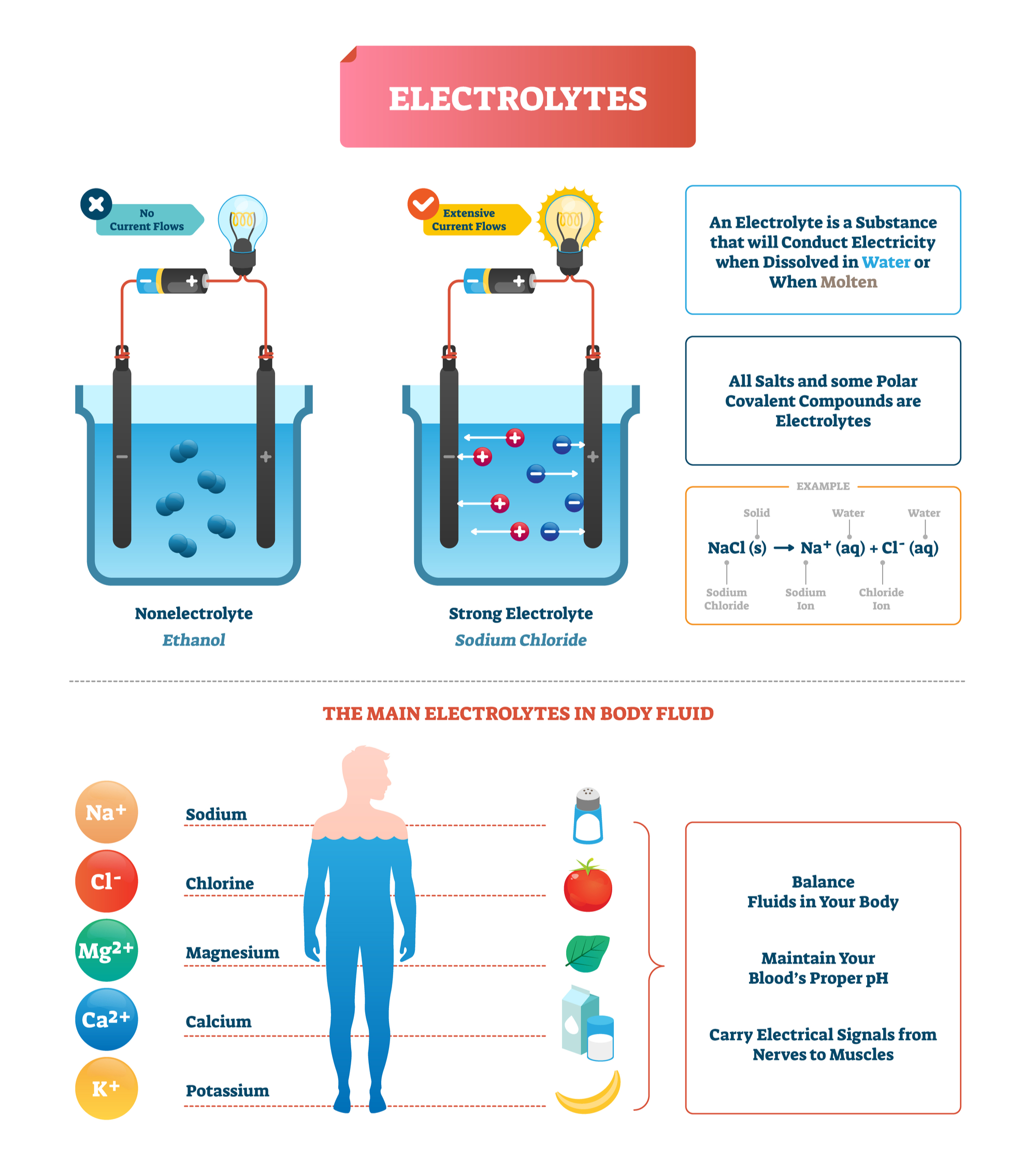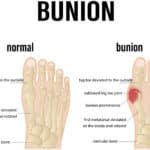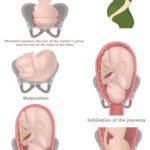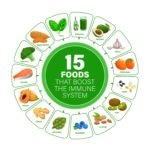Have you ever wondered why electrolytes are important and their uses in the body, In this post, we explain why.
Body cells perform their functions by sending signals through a coordinated movement of electrolytes in and out of the cells.
Were you taught the periodic table in High school? The periodic table of chemical elements is one of the first topics you learn in chemistry. Some of those elements are referred to as electrolytes.
Electrolytes are essential constituents of body fluids without which the numerous cells in the body cannot function optimally. Movement of electrolytes ensures that there is a maintenance of balance within normal ranges of concentration.
What are electrolytes
Electrolytes are chemical compounds that dissolve in water and can conduct electrical current. They keep you healthy and your body works hard to maintain a good balance in varying proportions.
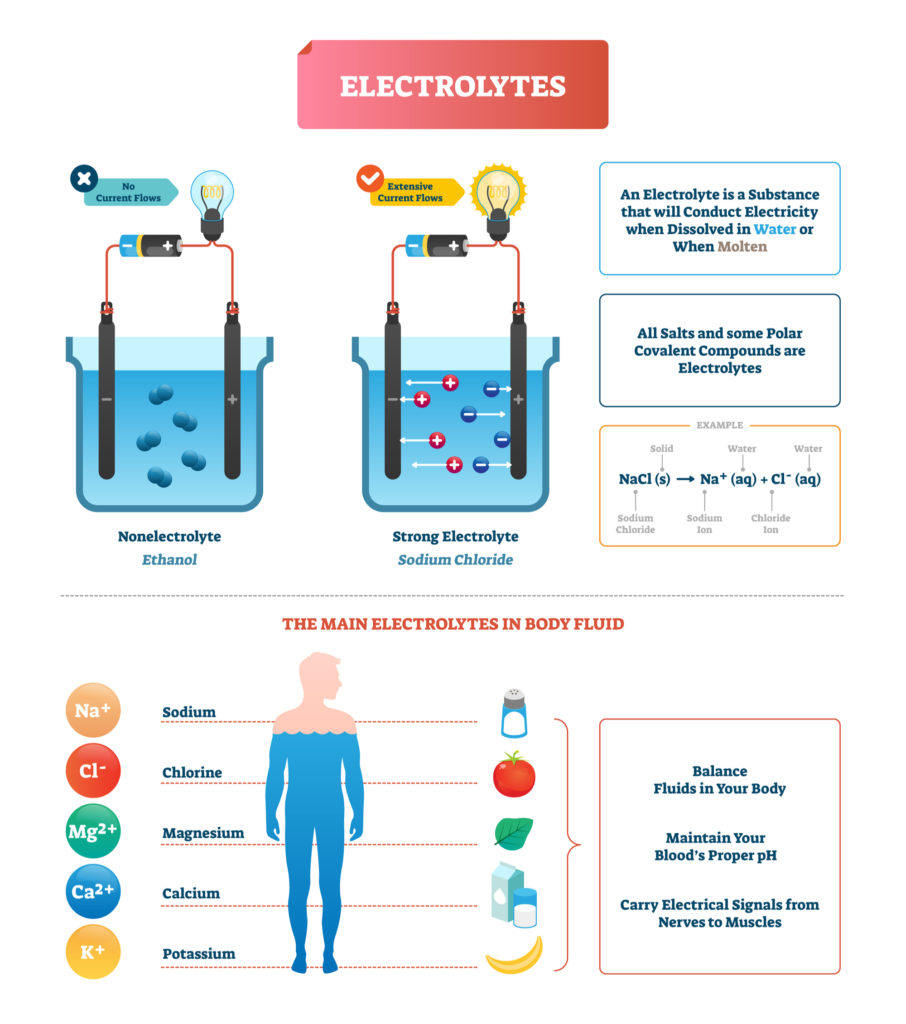
So these are why electrolytes are important
Body electrolytes
The main electrolytes are sodium, potassium, calcium and chloride. Others are magnesium, phosphate, fluoride, oxalate, citrate and bicarbonate.
Body electrolytes are present in all body fluids in different quantities. Various body fluids have different electrolyte constituents. Blood electrolytes give near accurate measures of the volume of different electrolytes in the body. They may be in body fluids such as blood, urine, tears, saliva and sweat or in the body tissues such as muscles, where they are utilised for cell function.
What electrolytes do in the body
Muscles contraction: Before you can perform any movement, your muscles need to contract. An alternating contraction and relaxation of opposing group of muscles takes place for you to achieve movement of your limbs for instance.
The movement of ions dissolved in water (electrolytes) in and out of the cell at specific times in the cycle of movement is what brings about muscle contraction and/or relaxation which causes your body to move. Your heart muscles have to contract to pump blood to the rest of your body; and relax to fill up adequately with blood that will be pumped out in the next cycle.
Chewing, swallowing and movement of food through your stomach and intestine all happen through alternating muscle contractions and relaxation (peristalsis).
This means that a lack of one or more electrolyte (sodium, potassium and/or calcium) that should perform this function will result in inability of the muscle to contract or paralysis of those group of muscles. It may also result in excessive involuntary muscles contractions and vice versa.
Muscular symptoms of electrolyte imbalance
If this happens in your skeletal muscles, it may lead to paralysis of your limbs which most often than not is temporary. It may also cause painful muscle cramps and generalised body weakness.
If this happens in your smooth muscles- the type of muscles that are seen in your digestive and urinary systems-then it may lead to constipation, inability to pass flatus and is a well-known mimicker of intestinal obstruction.
An imbalance in electrolytes may also affect your heart, causing the heart muscle to contract so forcefully that it ceases to relax, leading to death; or so slowly that it results in reduced blood flow to vital organs, organ failures and eventually death.
Nerve conduction: Nerves are body tissues that carry information from the brain and spinal cord to other parts of the body. This information is generated and transported by the movement of different electrolytes (sodium, calcium, phosphate, magnesium, chloride and potassium) in and out of the nerve cell.
Imbalance in electrolytes (either an excess or a depletion) will result in lack of generation of important information or lack of movement of vital information from the brain to other parts of the body or from the body to the brain.
Nervous symptoms of electrolyte imbalance include seizures, headaches, confusion, lethargy, abnormal behavior and altered levels of consciousness.
Maintenance of body fluid balance: Electrolytes together with your kidneys help to keep fluid levels in your body within balance. Since electrolytes are dissolved in water, a loss of body water implies a loss of body electrolytes. When there is an excess of electrolytes, the kidney filters out the excess which goes with water leading to reduction in body fluids. And when there is a reduction in electrolyte concentration, it signals the body to take up from stores or to lose more water in order to maintain the levels required by your body.
Symptoms of an imbalance of body fluids include excessive thirst, frequent passing of urine or reduction in urine output. Ever noticed that you urinate less often during the summer or hot seasons when you sweat a lot? That is your body holding unto the fluid available to maintain electrolyte balance.
Blood clotting: Calcium together with other body electrolytes (fluoride, oxalate and citrate) is a vital element in the process of blood clotting. Low calcium can cause delayed blood clotting following an injury and can lead to excessive bleeding and its attendant complications.
Haematological symptoms of electrolyte imbalance: Excessive bleeding, anaemia, l ow blood pressure and coma.
Maintenance of healthy bones and teeth: Calcium together with fluoride and magnesium in smaller proportions help to maintain strong bones and teeth.
Low calcium levels in the blood can cause the body to take calcium from the bones, subsequently the bones become “soft” and can break easily with trivial injury or fall. Excess calcium may result in bone pains, frequent urination and kidney failure.
Sources of electrolytes
Foods and fluids are sources of body electrolytes. Coconut water, caffeine, oral rehydration solution, table salt etc. contain electrolytes that your body requires to function.
- Sources of Sodium-Table salt, Cheese, electrolyte drinks, canned foods
- Sources of Calcium-Milk, yoghurts, sardine, lettuce, pumpkin leaf, cheese
- Sources of Chloride- Table salt, lettuce, pumpkin leaf
- Sources of Potassium- Banana, avocado, sweet potato, beans, tomato
- Sources of Magnesium-Groundnuts, cashew nuts, pumpkin seeds, spinach
How do we lose electrolytes?
Electrolytes are said to be depleted when their concentration drop below the lower limit of normal. You lose electrolytes excessively if you have
- Excessive sweating
- Diarrhoea
- Vomiting
- Burns (large skin area)
- Excessive urination
- Bleeding
- Inadequate intake
Electrolyte excess
Electrolyte excess is caused by reduced loss or increased intake or production in the body. It may result from kidney failure, liver disease, cancers, drugs such as chemotherapy drugs for cancer patients.
Treatment of electrolyte imbalance
Electrolyte depletion or low electrolytes is treated by replacing the lost electrolytes. This can be through increased intake of dietary sources, oral medications/supplements, or drips and injections.
Excess electrolyte is treated by giving drugs that will increase loss of that electrolyte from the blood. For instance, administration of insulin can reduce potassium concentration in the blood because insulin drives potassium into the cells. Oral drugs or drips and injections may be given to reduce electrolyte excess. Procedures like dialysis may also be done to reduce excess electrolytes.
In summary, symptoms of electrolyte depletion and excess may be similar and an objective way of finding out is through a blood test which is sometimes called a kidney function test. This is because the kidney regulates fluid and electrolyte balance. Therefore, an imbalance indicates a problem with kidney function. Correction to normal levels is imperative to ensure return to normal bodily functions and avoid death and disability.
